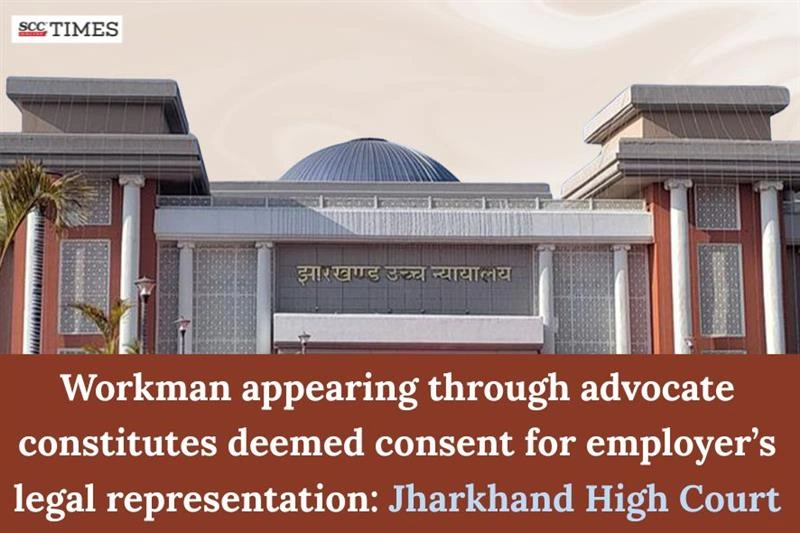Jharkhand High Court: In the petition filed by Alembic Pharmaceuticals Ltd., challenging the impugned order that upheld the workman’s application under Section 36(3) and (4) of the Industrial Disputes Act, 1947 (‘the Act’) and barred the Management’s advocate from appearing in the reference proceedings, a Single Judge Bench of Deepak Roshan, J., held that when a workman appears through advocate, it is treated as deemed consent for employer’s legal representation. Reiterating the well settled law, the Court observed that consent may be either express or implied, and leave can be granted directly by the Labour Court or inferred when the Court permits an advocate to appear and entertains applications filed by such advocate.
Background:
The case arose from the workman’s challenge to his removal from service under Section 2(A)(2) of the Act before the Labour Court, Jamshedpur. On 16-08-2024, he filed a preliminary objection under Section 36(3) and (4) of the Act, opposing representation of the Management through an advocate, though the petition did not assign any specific reasons.
Subsequently, on 12-11-2024, the Management appeared through its advocate and sought adjournment, which was allowed by the Labour Court. The Management then filed a reply asserting its right to be represented by counsel, contending that implied consent and deemed leave had been granted since the adjournment application was accepted. It further relied on the order dated 04-10-2024, which recorded the workman’s attendance through counsel, arguing that this amounted to waiver of the earlier objection.
The workman opposed this position, filing a counter-affidavit in which he maintained that the order dated 04-10-2024 had wrongly recorded his attendance through counsel. He reiterated the claim and relied on a subsequent order dated 29-07-2025, wherein the Labour Court accepted his contention that the earlier order was erroneous.
Analysis and Decision:
The Court observed that the representation of parties in industrial adjudication is governed by Section 36 of the Act. The Court noted that Section 36 of the Act primarily allows workers to be represented by members of a registered trade union and employers by an officer of an employers’ association. It was also emphasised that a key restriction lies in Section 36(3) of the Act, which prohibits legal practitioners from representing parties in conciliation proceedings or before the Court.
However, the Court highlighted that Section 36(4) of the Act permits legal representation before a Labour Court, Tribunal, or National Tribunal with the consent of the opposing party and the leave of that judicial body. Thus, though Section 36(3) of the Act imposes a complete embargo on representation of parties through advocates/legal practitioners before the Conciliation Officer, Section 36(4) of the Act permits representation through a legal practitioner before Labour Courts and Tribunals with the consent of the other parties and the leave of the Court. The Court further observed that the complete embargo on the appearance of Advocates in industrial adjudication is confined to conciliation proceedings alone.
The Court emphasised that the law is well settled that consent can be either express or implied. Leave can also be granted directly by the Labour Court, or it can be inferred when the Labour Court permits an advocate to appear and allows any application filed by an advocate. In the present case, though the workman filed a preliminary objection on 16-08-2024, he subsequently appeared through an advocate on 04-10-2024. The Court observed that his subsequent conduct amounted to a waiver of his earlier preliminary objection and constituted deemed consent. The Court held that once the workman has appeared through an advocate on one of the dates fixed in the case, he cannot prevent the other side from being represented by an Advocate.
The Court relied on precedents including Paradip Port Trust v. Workmen, (1977) 2 SCC 339 and Thyssen Krupp Industries India (P) Ltd. v. Suresh Maruti Chougule, 2023 SCC OnLine SC 1707, reaffirming that both consent of the opposite party and leave of the Court are required before any legal practitioner is permitted to represent either party in such proceedings. The Court observed that it was necessary to examine the factual matrix keeping in mind the twin tests of “consent of the other party” and the “leave of the Court.”
The Court noted that the Presiding Officer, Labour Court not only permitted the legal practitioner to file the Vakalatnama but also allowed his adjournment application on 12-11-2024. The Court observed that it was obvious there was implied consent and implied leave of the Court, and thus the subsequent withdrawal or allegation of a wrong order was unsustainable.
Therefore, the Court decided both issues in favour of the Management, holding that there was no absolute prohibition on representation of any party before the Labour Court, as the restriction was confined to conciliation proceedings only. The second issue, relating to implied consent and leave of the Court, was also decided in favour of the Management. The Court further held that there was no justification for debarring the advocate/legal practitioner representing the Management, hence, the order dated 27-02-2025 was found unsustainable and was accordingly set aside.
Consequently, the Court directed that the workman can also be offered legal assistance through the District Legal Services Authority, Jamshedpur (East Singhbhum), and that the Presiding Officer, Labour Court, Jamshedpur, should apprise the workman of his right to take legal assistance before proceeding further and moreover the Labour Court shall also decide the dispute expeditiously. The Court thus allowed the writ application and ordered that pending interlocutory applications, if any, also stand closed.
[Alembic Pharmaceuticals Ltd. v. Jay Prakash Singh, 2025 SCC OnLine Jhar 3607, decided on 04-11-2025]
Advocates who appeared in this case:
For the Petitioners: Nipun Bakshi, Advocate, Shubham Sinha, Adv, Raunak Sahay, Adv
For the Respondent: In Person


